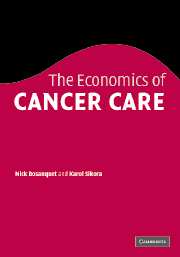Book contents
2 - Prevention
Published online by Cambridge University Press: 07 September 2009
Summary
Introduction
When assessing cost effectiveness, health economics often has to report on the high costs of activities presenting barriers to wider adoption. More rarely, problems loom on the demand side with a low take up of a programme, which costs little to organize. In the case of prevention, it is not the cost of the programmes that have been the main issue but rather achieving results. Prevention of cancer is immensely attractive as a goal but so far has led to more modest results than were predicted or indeed have been achieved in preventing coronary heart disease (CHD).
There have certainly been some gains within current prevention programmes principally in tobacco control. These include reductions in lung cancer coming about quite rapidly among middle-aged males in the US, UK, and more recently in Poland. Without such measures, total incidence and mortality might have shown a continuing increase rather than stabilising. International comparisons suggest that active tobacco control policies can reduce cancer mortality for men some 20% below the levels found within a nation of persistent smokers. Reducing smoking is the most effective and immediate way of reducing mortality from cancer. Yet lung cancer still results in over 50% of premature life years lost worldwide because of poor survival rates amongst those suffering the disease. Considering that prevention has a surprisingly rapid impact on reducing the toll, the dividend from successful prevention policies could be large.
- Type
- Chapter
- Information
- The Economics of Cancer Care , pp. 19 - 34Publisher: Cambridge University PressPrint publication year: 2006



